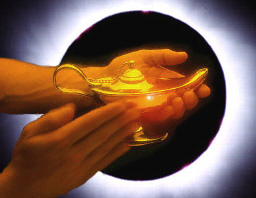


 |
|||||
 |
|
|
|
|
 |
|
|
|||||
|
The Parable of the Lamp
|
||||||||||||
| There developed in the twentieth century a people, strong in spirit and talents, kind of heart, and dedicated to liberty. They grew and flourished in a land of rich resources, aided by youthful imagination and daring, until they were known throughout the world. Among these fortunate people was placed a lamp of learning. They were told by the genie who presided over it: | ||||||||||||
| "Attend this lamp well and it will grant you wishes beyond your fondest dreams. It has the magic power to heal the sick, to harness the forces of nature or to make all the world beautiful and good. But remember, the lamp cannot wish for you; this you must do for yourselves. And if the wish is truly the desire of all the people, it shall be granted." | ||||||||||||
 |
||||||||||||
| Being young and headstrong, many of the people did not respect the power of the lamp. Some questioned its reputed magic. They impudently asked how a lamp with such a tiny, flickering flame could be so powerful. The genie was ridiculed and abused and assigned to low status among them. When they did agree upon wishes for the lamp, like Aladdin of old, they asked for an abundance of food, magnificent dwelling places, wealth and scientific baubles for their comfort and entertainment. One day as the people reveled in their push-button wonderland of automatic appliances, high-powered automobiles, and dreams of grandeur, they were startled by the appearance of a new star moving rapidly across the heavens. When they realized that this magical wonder was the gift of the lamp to the people of another land, they were filled with fear and apprehension that their freedom was in danger. In anger they began to cry out indignantly that they had been cheated by the lamp of learning. They cursed the genie for not making them wish for such a wonderful scientific achievement. Some threw sticks and stones to drive away the faithful few who had endeavored to attend the lamp. Many who previously ridiculed the genie began to fight among themselves for his favor. Each proclaimed loudly that others were to blame for this loss of face before the world. Committees were appointed to find a suitable scapegoat to compensate for their damaged pride. Above the din and confusion could be heard one distinct and persistent sound, an ominous, intermittent radio signal emitting from the new man-made miracle encircling the globe. It reminded all that the magic lamp of learning, if properly attended, has power to grant wishes beyond man's fondest dreams. It echoed the advice of the genie that the lamp cannot wish for a people. This they must do for themselves.
(This parable was written to help counteract the hysteria which gripped the people of the United States when they learned in 1957 that the USSR had successfully launched a satellite into space. It was published originally in The Nation's Schools in March, 1958. Subsequently, it was quoted and re-quoted, in the popular and professional press, on radio, and television. Our ultimate success in sending men to the moon proved my point: schools can achieve whatever goals are set, and supported for them by a nation. It is a message for all times and for all people.) |
||||||||||||